Mulan’s Relatability, Self-Discovery, and Selfishness
Despite its release twenty years ago, Mulan remains a favorite of the Disney classics. The film features a strong main female character who is relatable and unique from the other Disney princesses in more ways than one.
The film’s main character is based off of a popular Chinese legend in which a woman by the name Hua Mulan dresses as a man and takes her father’s place in the army (Klimczak).
Because the legend originates from China, Disney’s adaptation of Mulan easily sticks out from other Disney princess films. Her culture is fresh and captivating to an American audience who is immune to, and perhaps tired of, western-based stories. A film featuring a Chinese woman will stand out from the rest of the white Disney princesses.
But is Mulan “better” than other Disney films that lack this diversity?
Sticking to the same western cultures may make stories feel repetitive and dry, but exploring different cultures can allow for more unique one. Diversity can also draw in a different audience: people like seeing characters they can relate to and so a culture-specific film would bring in people from that culture.
Mulan Defining Herself and Self-Improvement
Mulan’s diversity is not the only reason the film sticks. Mulan as a character is a realistic portrayal of a young woman who doesn’t abide to traditional gender roles. One might view Mulan as a feminist icon because of how she defies gender stereotypes. She doesn’t actively rebel against the ideas of marriage or womanhood — she’s just a different kind of woman than what her culture expects.
Mulan defies gender stereotypes by accepting both a feminine and masculine identity. At the beginning of the film, she rejects ideas of femininity. She’s loud, socially awkward, and persistent. As her family prepares to find her a husband, Mulan is anything but a gentle, proper bride. She also struggles with a masculine identity as seen when she fails tests to prepare for war.
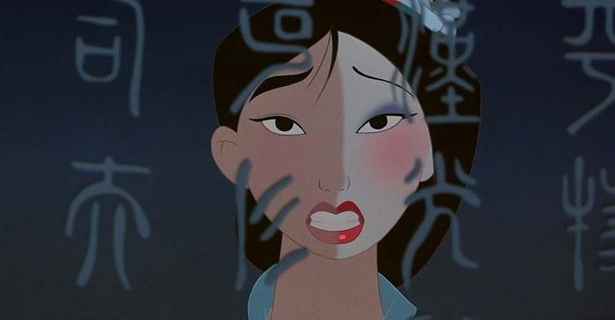
By the end of the film, she succeeds as a warrior (a masculine trait) which then allows her to accept her femininity. She declines a position in the royal palace and instead returns home as a daughter, not a warrior.
Mulan as a character is a rarity and the start of a new trend in the Disney princesses. Often times, Disney princesses reflect gender expectations and ideals. Snow White, for example, is passive and praised for her beauty and never steps out of these boundaries. And while princesses such as Cinderella are independent and go out into the world for their own betterment, the prince still seeks her out for her beauty and gentleness.
Mulan goes to war and becomes a solider: a very masculine thing to do compared to previous princesses. This experience forces her to step out of her comfort zone, thus adding to her character development. Mulan sticks out from the rest of the soldiers. She doesn’t know how to interact with men, especially in a scenario when there are just men behaving as they would without any women around.
This war setting leaves no expectations for how Mulan should act as a woman: she has the freedom to act as she pleases so long as she receives approval from the other soldiers. She uses her intelligence to overcome obstacles, such as taking advantage of the weights to help her climb the pole rather than drag her down.
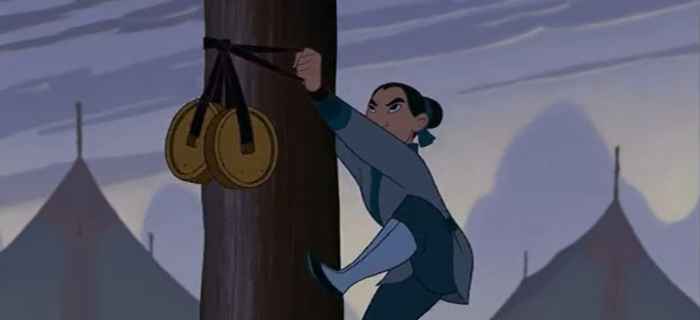
These types of challenges test her problem-solving skills. She cannot show-off her strengths as a woman because society expects women to be passive. But here, gendered expectations cannot hold her back, thus allowing her to overcome obstacles, gain approval, and improve self-worth.
No other classic Disney princess has found herself in a war and playing the part of a soldier. Mulan is the perfect princess for this role. She has the determination to prove herself and is no longer limited to behave as a woman should. She still identifies as a woman and sees herself as different from the rest of the troops, but none of them shame her for not behaving as they think a woman should.
Mulan’s Universal Relatability
Relatable characters can teach and inspire audience members. Moreover, people who see themselves in their favorite characters feel a sense of belonging (Haberstroh). One reason many people enjoy the film is because of how many people can relate to Mulan. She is not just relatable to a niche of people: just about anyone can see themselves in her.
The first obvious type of people who relate to her are women. This story covers specifically Chinese women and how they are supposed to act, dress, and bring honor to their family by marrying a respectable man. Mulan represents real-world girls who do not necessarily want to behave a certain way or marry a certain man — or marry at all.
As she settles into camp with the other troops, Mulan finds herself not fitting into how men should behave and treat each other. She has an idea, but she fails at executing appropriate behavior, such as how she accidentally starts a fight in attempt to appear manly.
Mulan, then, represents boys who do not fit into masculine culture. Of course, she’s a girl raised to behave as a girl. She has only observed masculine behavior to help guide her alongside poor advice from her dragon companion, Mushu. But technicalities aside, she does portray the difficulties a boy might face if he does not adhere to masculine culture as is expected of him.
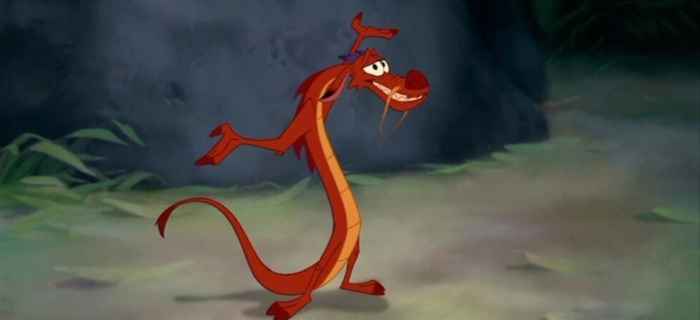
If one wants to take this analysis a step further, then viewers might also interpret Mulan as an allegory for struggles transgender men experience. Mulan grew up believing she was a girl but found herself failing to uphold gender traditions. She then switches from being Fa Zhou’s daughter to his son, Ping. And lastly, she struggles to fit into masculine culture as she faces rejection of her newfound gender as well as discomfort in her discovery to identity.
The end of the song “I’ll Make a Man Out of You” represents struggles transgender men may face. Mulan has failed to prove she’s soldier-material, so Shang kicks her out of the camp. Instead of leaving, she’s determined to prove she can be a solider — or be a man, in other words. She climbs the pole and retrieves the arrow, a feat none of the other troops managed, and proves to Shang she is valuable.
Mulan, like transgender men, is incapable of proving she’s biologically a man. The only way she can prove herself is through her actions. Transgender men may find themselves in a similar position in which they have to prove their manhood through their attire, behavior, and actions that other men would approve of.
The Importance of Selfishness
Audiences cherish Mulan because of her selflessness: she leaves for war so her father doesn’t have to, she risks her life to save Shang during the avalanche, and she puts herself in danger to save the emperor from Shan Yu.
At first glance, Mulan seems totally and a hundred-percent selfless because she does all of this for the sake of other people’s lives, not her own.
But Mulan’s long-term goal is selfish. Her motivation to go to war to save her father is selfless, but her motivation is just as selfish because what she really wants is to find herself. Everything she does is to bring her one step closer to finding her identity. The song “Reflection” shows how from the beginning, Mulan wants to find out who she is. Saving her father is only a stepping stone for her self-discovery.
After the troops discover Mulan’s true gender and leave her, she looks at her reflection in her helmet. She says, “Maybe I didn’t go for my father. Maybe what I really wanted was to prove I could do things right. So when I look in the mirror, I’d see someone worthwhile.” This line in the film encompasses Mulan’s true motivation. Although saving her father’s life is a benefit, what Mulan really wants out of this experience is to go to war for her own betterment. In her case, selfishness is an entirely good thing. Viewers see her struggle to understand who she is and want to see her figure that out by the end of the film.
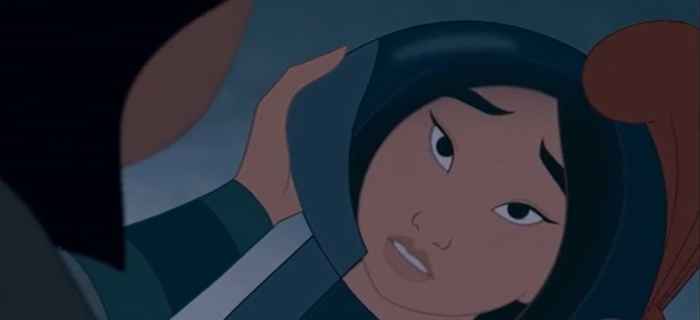
In no way is her selfishness a negative — in fact, it’s one of her best personality traits. A character like Mulan sticks out because she is a healthy mix of both selfishness and selflessness. Her selflessness allows her to connect to other people, while her selfishness allows her to grow and ultimately is what teaches her self-worth.
Conclusion: Going Back to Her Roots
Although there are variations to the legend, the most widely known version of the story has Mulan voluntarily reveal her true gender to the rest of the soldiers during battle. The soldiers don’t react negatively and instead respect her more for her honesty (Klimczak). But in the Disney film, the soldiers are at first appalled and confused to find out she’s a woman. It isn’t until later when Mulan saves the emperor does she get the respect she had been fighting for. The reaction to Mulan’s true gender is the biggest difference between the source material and Disney’s adaptation. If the soldiers reacted more positively to her gender reveal, then perhaps the film could have taught viewers that gender identity doesn’t have to hold an individual back from achieving their goals. Or, views can interpret the Disney version as showing how people will still question women’s abilities and strengths regardless of what they have achieved and are capable of.
References
Haberstroh, Kelly. The Importance of Relatable Characters in Entertainment. The Odyssey, 26 April 2016, https://www.theodysseyonline.com/the-importance-of-relatable-characters-in-entertainment.
Klimczak, Natalia. The Ballad of Hua Mulan: The Legendary Warrior Woman Who Brought Hope to China. Ancient Origins, 1 Jan. 2016, https://www.ancient-origins.net/history-famous-people/ballad-hua-mulan-legendary-warrior-woman-who-brought-hope-china-005084.
Mulan. Directed by Tony Bancroft and Barry Cook, performances by Lea Salonga, Donny Osmond, Soon-Tek Oh, and Eddie Murphy, Walt Disney Pictures, 1998.
What do you think? Leave a comment.
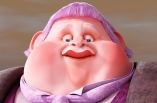
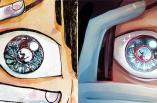



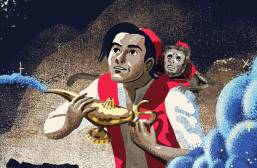

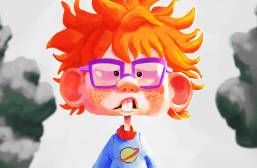



This was perhaps my favorite movie as a child.. to me it was an action movie for kids.. looking back though, I credit this movie partly for the ability to look up to heroes regardless of their sex. I related to Mulan, I wanted to be a great warrior just like her. It didn’t matter that I was a boy and she was a girl, she was bad ass! And I wanted to be just like her.
Awesome movie. I loved mulan because she was a bad ass.. Not because she was a bad ass woman, that had nothing to do with it. I think that that makes the story so much stronger.. she isn’t just a strong warrior for a girl, she’s a strong warrior in general.
Everything in this movies is remarkable. My mom’s favorite Disney movies are The Lion King and Beauty and the Beast. Mine’s are this one and Tarzan. So I made her watch Mulan for the first time and she loved it. And she’s a hard cookie. Literally all the songs in it are great. Certain scenes gave me chills. The soundtrack during the action sequences are riveting. Mushu, the Grandma, and the ancestors are absolutely hilarious. I cried at the end of Wreck-It Ralph and during Big Hero 6, and I was surprised to see myself cry at the end of Mulan. Love love love
The problem that I had with the film is the voice acting. Whoever did the voice of Mulan had no emotion whatsoever. Plus I did not understand the ending scene. There were hundreds of thousands of Chinese and just a couple of Huns. How is just a couple of guys and a bird a threat to China? Where was the royal guard to protect the emperor? Other than that it was an okay film.
I think this movie isn’t just cultural but it’s best feature is it is Disney’s best representation of a positive relationship. Shang respected Mulan as a soldier because she works hard, so when it is revealed Mulan is a girl this respect is already in place. Same with Mulan respecting Shang as a general and leader. They both had a respect and understanding of one another that was not just built on genitals. That’s the best example of a good relationship.
Brilliant article. Mulan is a masterpiece. So thematically rich. Even her horse deals with identity issues- being called a “cow” when it’s not being “horse” enough.
The horse’s name is Khan, which is interesting…
Gender and identity issues at its best.
I think what is important is the meaning we find rather than some objective, “accurate” meaning. To some extent, you take what you put in. I came to Mulan deeply repressed and self-loathing and, despite the popular “be a man” chorus, it meant, to me, that it was ok for me to be a woman. Someone that approaches it from a different perspective will leave with a different meaning.
Being trans and having loved this movie as a kid, but haven’t rewatched it since finding out abt being a trans woman…
An enjoyable essay. I’ve recommended it to my middle daughter who dressed up as Mulan several times when she a lot younger for Halloween.
Good job addressing the many qualities that make Mulan such a great character. I liked the relatability section a lot and how you emphasized Mulan’s connection to many different groups of people. Growing up, I’ve watched Mulan many times and have always enjoyed the movie!
Mulan does feminism well, it isn’t pushing a fake agenda. Mulan was the naturally the weakest soldier there, but she became one of the best through work. She didn’t ask for a handout. She didn’t wasn’t one of those “WAAA WOMEN CAN FIGHT, TOO!” she showed it. I wish feminism today in movies was done like Mulan.
Mulan is why there is an extra criteria to be a Disney princess (they are marry royal and be royal and thanks to mulan commit an act of heroism each princess has to at least have one of these to be an official princess)
You hit all the points I appreciate Mulan, and why, although it wasn’t my favorite as a child, it is the best Disney movie to hold up into my adulthood. It wasn’t until my late teens, when I was really struggling to find myself as a person and as an adult that this movie reentered my life and helped me through some tough times. From the standpoint of a female Chinese American as well, the way in which this movie treated my culture, not to mention the extreme relate ability of Mulan, really makes this movie one of the best movies ever. Like you discussed, Mulan was so inspiring because she did feel that struggle between her culture, her family, and herself, and her navigation of it, to be able to reconcile it all, made it a very moving, beautiful experience for me as a person who wishes for the same. No matter how many accolades this movie receives, it will always be underappreciated in my book.
I agree, even now I think the true beauty of what this movie does and what it stands for is lost on so many people.
Great article. Mulan is one of those movies that I didn’t appreciate until I matured a bit more. That’s how it is with most films for me, considering I’m not that much of a movie person, but I’m glad I gave the movie another chance and watched it again. Didn’t at all fail to impress.
Mulan has been my favorite Disney princess since I was a kid. She’s kind and gentle, but also a total badass. She is super smart and brave. I had such a bad crush on her as a kid.
I think the reason Mulan is a lot of people’s favorite princess is because she get’s by far the most focus on her movie. All other princesses have to share the spotlight or are mostly overshadowed by their male counterpart. Jasmine is overshadowed by Aladdin and Belle has to share the spotlight with the beast. Mulan is almost the complete focus of her movie and everything in it revolves around her.
Mulan and Moana are the best! They are true hero’s.
I love Mulan, but one aspect bugs me. When Mulan is exposed, her commander rejects her and he doesn’t actually try to make amends til the Emperor mocks him. But you know who believed her when she warned them? Her comrades. The skinny guy. The fat guy. The short stocky guy with one eye. The handsome noble commander got caught with his pants down by the Huns, but not Mulan’s squad mates who all hated her in the beginning. Her squad listened to her warning and was ready. Yet she doesn’t love them. Nope, the men who believed in her and followed her orders and had her back weren’t good enough. She needed a pretty noble who was a dick to her for 98% of the movie. Her squad believed in her before the commander, before the Emperor and didn’t care she was a woman. Great job Mulan. Because what is really important isn’t men who respect women, but handsome men who disrespect women. And men, respect for women is plainly worthless if you are skinny, fat, short or have any physical flaws. You can disobey your commander and follow a woman who dresses up as a man, but you’ll always be nothing to her.
You nailed it. Thanks for talking about her true motivation instead of making it all about girl power and feminism. She’s an awesome woman, but her motivation was purely to do the right thing and help her family. That’s one of the things they got wrong in the sequel IMHO.
Nice analysis, finding Mulan’s true motivation. At first, I thought Mulan is actually one of the less relatable Disney heroines because what modern moviegoer gets the opportunity to fight a war in place of our father, masquerading as someone else, and then save an entire country almost singlehandedly? But you’re very right; she’s relatable because she discovers things about herself through difficult circumstances.
I also like how you related selfishness, selflessness, and self-discovery together. I’ve been thinking about those topics quite a bit; right now I’m in an internship-type program that gives me many opportunities to be selfless and help a lot of people. The whole thing, though, is engineered to help my teammates and I learn things about ourselves and then improve ourselves. It’s not “selfish,” per se, but understanding the benefit to ourselves is a great motivator to do these things for others. Mulan had the same motivation.
This was a really interesting article! I really enjoyed how you incorporated the selfishness and selflessness in it.
You perfectly summed up my thoughts about ‘Mulan’. It is hands down my favourite Disney movie ever!
I literally just delivered an entire presentation on the same topic. I love Mulan because who she was before and after the war is the same amazing person. The only thing that changes is her confidence in herself.
My favorite scene is when whatever miraculous makeup remover is on her sleeves somehow manages to remove EVERY TRACE of makeup from her face. Seriously. HOW?
Mulan is so much better than Elsa. Yes Elsa didn’t end up with a man but she created her own problems. Mulan ended up with a man but she wasn’t in love with him/trying to get him the whole time and the main problem in the movie wasn’t a result of her actions, she just took on the consequences
Honestly, Mulan was the first to set the path of Disney Princesses that needed no man to win what they truly desire. I loved both Mulan and Mulan 2(I still can’t get over Lesson Number One even in the native Chinese languages). Mulan was the first on many Disney princesses to not need a man. Mulan ended up with one. Personally to me, it’s better then Snow White leaving the 7 dwarves for a prince that’s like 10 years her age or Aurora leaving with a prince she barely even knew but loved somehow already. Mulan set the path for Disney Princesses like Merida, Tiana, (a bit of) Elsa, Moana(technically she doesn’t marry or even love a man even though she needed one as it was his fault Te Fiti became Te Ka, she was just blinded by the fact she could’ve done it herself and didn’t trust herself to do it. I believe that Merida and Mulan are more similar then Tiana as in the end Tiana marries a prince while Merida is left with a better relationship with her mother. Elsa technically didn’t need a man, she just needed to open up to her sister. If she did, what happened in Frozen would’ve been toned down in my opinion. Anna also believed she needed a man being coped up in a castle but she too learned she needed her sister and kinda also fell in love so both the Frozen heroines kinda aren’t princesses that followed what Mulan set out or paved a path for. Mulan will always be the first Disney princess to didn’t need a man(yes she ended up with one but remember this movie came out during the times of the first Disney Princesses and they all had a true love so Disney is progressive but not very progressive). Either way, even if it wasn’t Shang Mulan ended up with, she was going to end up with someone as she either A) do something in place of the Emperor’s daughters as she will always have that feeling to protect her country, B) probably want to continue her family’s name somehow as she is an only child and a girl so that’s really her only job to society in her country(and mostly other countries but I know Asian countries put a lot emphasis on this) or C) Fall in love with someone that probably isn’t Shang since she is human, we either get an attraction to someone or we fall in love after being friends for awhile(unless you’re Asexual but I read some Asexuals also fall in love but it just has to be a deeper connection, correct me if I’m wrong.).
This was an extremely helpful article for my senior thesis. Thank you for sharing!
Mulan was my favorite Disney movie as a kid and it turns out i’m nonbinary. looking back at it now, especially through the lens of your discussion here, it gives me serious chills.
Great analysis, I had never thought about the movie’s themes in such depth. Thank you!
Mulan is such an amazing movie. it’s one of my favorites!
Loved this article. So pleased you touched on trans men–that was definitely something I didn’t pick up on as a kid, and now that I’m older, I can totally see in Mulan’s story.
I wish more Disney movies had a nuanced message about gender and identity like Mulan. Awesome article.
Mulan was one of the first movies I vividly remember watching in the movie theater when I was younger, so of course it’s going to have a very special place in my heart!
Mulan is definitely one of my favourite Disney films. I really like that the character of Mulan is not made out to be extremely/unrealistically beautiful, as the princesses before her were.
Mulan is definitely one of the best Disney films – so different from the others.
Mulan has to be one of my all-time favourite Disney Movies. When I was a little girl, I wanted to grow up and be a pirate or a warrior and I was inspired by movies that showed strong females characters, such as Mulan. As a movie it has so many fun contributing factors. You learn family values, watch as the characters develop their personality traits, and as a bonus it has an amazing soundtrack. I just love it 🙂
Mulan has always been my favorite Disney movie~ I really enjoyed your analysis of the film as well as what aspects of Mulan’s character make her so relatable and likable.
Nice article. I especially like how you examined the selfishness and selflessness of Mulan’s motives–because yes, your motives can be both. Other Disney heroines have done this (Belle, Tiana, Cinderella, etc.) But because princesses/heroines are supposed to be “ideal women,” you rarely if ever hear them admit, “Yeah, I have a selfish reason for what I’m doing.” Mulan does that, in a way that keeps her empathetic to the audience. It’s refreshing, and we need more of it.
Mulan has always been one of my favourite films for these reasons – an excellent article!
Mulan was one of my favorite movies as a kid. I love the focus on the female character. A lot of Disney movies I had watched, had the typical “princess saved by prince”, however, this movie defied the social construction of gender roles. It was an empowering film. Your arguments provide a great capture of her character. Loved this article.
It’s interesting that you begin this piece with the question of if Mulan is lauded as such a great film simply because it was more diverse than most animation of the period. I say this because I feel like it’s answering a question that people were never really asking. While I wasn’t really cognizant of conversations at the time of the film’s premiere, I feel like the general consensus nowadays is that the film has always been great for the reasons listed. That said, I love your analysis of Mulan’s selfishness and how that plays into her decision making in the film. Despite a gazillion rewatches of the film, I never thought about it like that. Awesome article!
This is my favourite movie of all time and I’m sure always will be, but the original Chinese folklore has no mention of a love story or romantic precepts, and this is a major issue I identify with the Disney version. I love your allegory of Mulan and transgender men; a great article!
I love Mulan, and I enjoyed what you said about her motives. I think this shows that Mulan is a complex character. No one is made up of purely selfless or selfish motives. Our actions can be caused by multiple sources. Some sources might be more motivating than others, but we can have many reasons for what we want to do, and some of those reasons may be hidden even from ourselves.
Mulan gave way for many children to feel better about not having to fit into stereotypes. In a course I took at school I was able to look at the original legend and how it changed over time. The theme is always the same she goes to war for years in place of her father (or brother depending on the telling), but there are differences that reflect the changes in culture and ideals. Overall Mulan is what in my terms I consider a heroine, because of her resilience through difficult times. The Disney version is a good combination of the versions.
Not only did she express her filial piety but by breaking the stereotypes, there was a break in the distressed princess that needed to be saved.